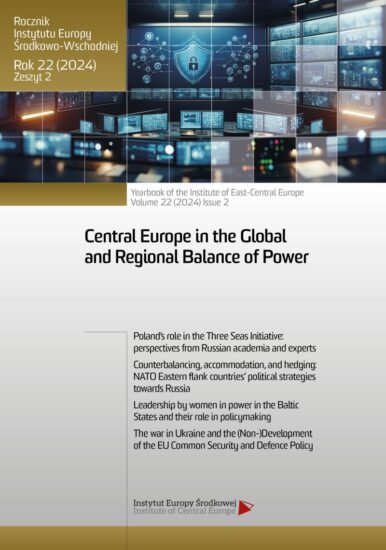Determinanty i wyzwania bezpieczeństwa energetycznego w krajach UE
ORCID: Janusz Rosiek: 0000-0001-6290-4724
Afiliacja: Krakow University of Economics
Strony: 75-93
Wydanie: Lublin 2024
DOI: https://doi.org/10.36874/RIESW.2024.2.4
Sposób cytowania: J. Rosiek, Determinants and challenges of energy security in EU countries, „Rocznik Instytutu Europy Środkowo-Wschodniej” 22 (2024), z. 2, s. 75-93, DOI: https://doi.org/10.36874/RIESW.2024.2.4
Słowa kluczowe: bezpieczeństwo energetyczne, determinanty bezpieczeństwa energetycznego, wyzwania bezpieczeństwa energetycznego UE
Keywords: determinants energy security, energy security, EU energy security challenges
Abstrakt: Głównym celem artykułu jest przedstawienie zagrożeń i wyzwań związanych z zapewnieniem bezpieczeństwa energetycznego w krajach UE. Refleksje na ten temat przeprowadzono z wykorzystaniem różnych definicji pojęcia bezpieczeństwa energetycznego, jego determinantów oraz kluczowych obszarów. Artykuł opiera się na dostępnych badaniach zawierających analizy bezpieczeństwa energetycznego w krajach UE na tle ogólnego pojęcia opisanego w różnych podejściach. Opracowanie zawiera analizę różnych podejść do kwestii bezpieczeństwa energetycznego, z wartością dodaną w postaci prezentacji perspektyw bezpieczeństwa energetycznego krajów UE w kontekście aktualnych wyzwań wynikających z sytuacji geopolitycznej w Europie i na świecie, a zwłaszcza konsekwencji kryzysu gospodarczego. Ponadto zwrócono uwagę na charakterystykę bezpieczeństwa energetycznego jako dobra publicznego. Publikacja przedstawia koncepcję bezpieczeństwa energetycznego, ze szczególnym uwzględnieniem kwestii jego zapewnienia w odniesieniu do krajów UE.
Bibliografia:
1. ACER (Agency for the Cooperation of Energy Regulators), ACER Market Monitoring Report – 2015. Annual Report on the Results of Monitoring the Internal Electricity and Natural Gas Markets in 2014, 2016, https://www.acer.europa.eu/sites/default/files/documents/Publications/ACER_Market_Monitoring_Report_2014.pdf.
2. Alhajji A.F., What Is Energy Security? Definitions and concepts, “Middle East Economic Survey” 2007, vol. 1, no. 455.
3. APERC (Asia Pacific Energy Research Centre), Institute of Energy Economics, Japan (IEEJ), A Quest for Energy Security in the 21st century, 2007, www.ieej.or.jp/aperc [27.03.2024].
4. Braun J., Bezpieczeństwo energetyczne jako dobro publiczne – miary i czynniki wpływające na jego poziom, “Studia Ekonomiczne. Zeszyty Naukowe Uniwersytetu Ekonomicznego w Katowicach” 2018, no. 358.
5. CEEP (Central Europe Energy Partners), Central Europe Energy Partners’ Recommendations for Trilogues on the Directive on the Promotion of the Use of Energy from Renewable Sources (RED 2), 2018, https://horizoneuropencpportal.eu/stakeholders/central-europe-energy-partners-ceep [11.04.2024].
6. Chester L., Conceptualising energy security and making explicit its polysemic nature, “Energy Policy” 2010, no. 38, pp. 887–895, https://www.researchgate.net/publication/223457986_Conceptualising_energy_security_and_making_explicit_its_polysemic_nature [16.03.2024].
7. Chevalier J.M., Security of energy supply for the European Union, “European Review of Energy Markets” 2006, vol. 1, no. 3, https://eeinstitute.org/european-review-of-energy-market/EREM%203%20article%20Jean-Marie%20Chevalier.pdf [20.04.2024].
8. Clingendael Institute, Clingendael International Energy Programme (CIEP), EU Energy Supply Security and Geopolitics (Tren/C1-06-2002), CIEP Study, 2004, http://www.clingendael.nl/publications/2004/ 200401000_ciep_study.pdf [29.03.2024].
9. Council of the European Union, Renewable Energy: Council Confirms Deal Reached with the European Parliament, 2018, www.consilium.europa.eu/en/press/press-releases/2018/06/27/renewable-energy-council-confirms-deal-reached-with-the-european-parliament [2.04.2024].
10. Demski C. et al., National context is a key determinant of energy security concerns across Europe, “National Energy” 2018, no. 3, pp. 882–888, https://doi.org/10.1038/s41560-018-0235-8 [3.04.2024].
11. EC (European Commission), Communication from the Commission to the European Parliament and the Council. European Energy Security Strategy, SWD(2014) 330 final, 2014, https://eur-lex.europa.eu/legal-content/EN/TXT/PDF/?uri=CELEX:52014DC0330&from=EN [22.03.2024].
12. EC (European Commission), Communication from the Commission to the European Parliament, the Council, the European Economic and Social Committee, the Committee of the Regions and the European Investment Bank. Second Report on the State of the Energy Union, COM(2017) 53 final, 2017.
13. EC (European Commission), Communication from the Commission to the European Parliament, the European Council, the Council, the European Economic and Social Committee and the Committee of the Regions. Repower EU Plan, SWD(2022) 230 final, 2022, https://eur-lex.europa.eu/resource.html?uri=cellar:fc930f14-d7ae-11ec-a95f 01aa75ed71a1.0001.02/DOC_1&format=PDF [6.04.2024].
14. EC (European Commission), Joint Communication to the European Parliament, the Council, the European Economic and Social Committee and the Committee of the Regions. EU external strategy energy engagement in a changing world, SWD(2022) 152 final, 2022, https://eur-lex.europa.eu/legal-content/EN/TXT/PDF/?uri=CELEX:52022JC0023 [30.04.2024].
15. EC (European Commission). Directorate-General for Energy (ENER), In focus: EU energy security and gas supplies, https://energy.ec.europa.eu/news/focus-eu-energy-security-and-gas-supplies-2024-02-15_en [6.04.2024].
16. ECEEE (European Council for an Energy Efficient Economy), EU policies for energy efficiency, energy security and climate change mitigation, 2024, www.eceee.org/policy-areas/energy-union [6.04.2024].
17. Empowering Europe: Developing a Roadmap to Strategic Autonomy and a Competitive Energy Transition, materials from discussion introducing European Initiative for Energy Security (EIES), 2023, https://pr.euractiv.com/pr/empowering-europe-developing-roadmap-strategic-autonomy-and-competitive-energy-transition [1.04.2024].
18. Energy Charter Secretariat, The International Energy Charter Consolidated Energy Charter Treaty with Related Documents, 2015, https://www.energycharter.org/fileadmin/DocumentsMedia/Legal/ECTC-en.pdf [3.04.2024].
19. EPO and IRENA (The European Patent Office and the International Renewable Energy Agency), Development and Deployment of Climate Change Mitigation Technologies: Evidence to Support Policy Making, Policy Brief, 2016, https://link.epo.org/web/Development_and_deployment_of_climate_change_mitigation_technologies-Policy_Brief_en.pdf [2.04.2024].
20. EU (European Union), EU Energy Platform, https://energy.ec.europa.eu/topics/energy-security/eu-energy-platform [7.04.2024].
21. EurObserv’ER, The State of Renewable Energies in Europe, 18th EurObserv’ER Report, edition 2018.
22. https://kib.pl/wp-content/uploads/2019/04/The_State_of_RES_in_Europe_2018_v2.pdf [1.03.2024].
23. Eurostat, Electricity prices for household consumers – bi-annual data (from 2007 onwards), 2019, http://ec.europa.eu/eurostat [12.03.2024].
24. Eurostat, Energy imports dependency, 2019, http://ec.europa.eu/eurostat [22.03.2024].
25. IEA (International Energy Agency), Energy Security and Climate Policy: Assessing Interactions, 2007, https://iea.blob.core.windows.net/assets/01fda85f-c396-47bf-9ef9-686e78b0a7f7/energy_security_climate_policy.pdf [15.03.2024].
26. IEA (International Energy Agency), World Energy Outlook. China and India insights, 2007, https://eneken.ieej.or.jp/en/data/pdf/412.pdf [31.03.2024].
27. Jenny F., Energy Security: a market-oriented approach, presentation at the OECD Forum on innovation, growth and equity, Paris, 14–15 May 2007, /www.oecd.org/dataoecd/42/49/38587081.pdf [25.03.2024].
28. Kruyt B. et al., Indicators for energy security, “Energy Policy” 2009, no. 37, pp. 2166–2181, https://www.sciencedirect.com/science/article/abs/pii/S0301421509000883.
29. Mazurkiewicz J., Bezpieczeństwo energetyczne Polski, “Polityka Energetyczna” 2008, vol. 11, issue 1, https://epj.min-pan.krakow.pl/pdf-95660-29132?filename=Energy%20security%20of%20Poland.pdf [11.04.2024].
30. Owsiak S., Finanse publiczne. Teoria i praktyka, Warsaw 2013.
31. Perez M. de la Esperanza M., Scholten D., Smith Stegen K., The multi-speed energy transition in Europe: Opportunities and challenges for EU energy security, “Energy Strategy Reviews” 2019, vol. 26, https://www.sciencedirect.com/science/article/pii/S2211467X19301087? via%3Dihub [4.04.2024].
32. Skindzier O., Od czego zależy bezpieczeństwo energetyczne?, Money.pl., 10 June 2022, www.money.pl/gospodarka/od-czego-zalezy-bezpieczenstwo-energetyczne-6778365727709888a.html [5.04.2024].
33. Sovacool B., Mukherjee I., Conceptualizing and measuring energy security: a synthesized approach, “Energy” 2011, no. 36, pp. 5343–5355, https://www.sciencedirect.com/science/article/abs/pii/S0360544211004294.
34. Toman M.A., International oil security: problems and policies, “Resources for the Future” 2002, no. 2–4, https://media.rff.org/documents/RFF-IB-02-04.pdf.
35. Wernik A., Finanse publiczne: cele, struktury, uwarunkowania, Warsaw 2014.
36. Winzer C., Conceptualizing energy security, “Energy Policy” 2012, no. 46, pp. 36–48, https://doi.org/10.1016/j.enpol.2012.02.067.

PDF: Pobierz